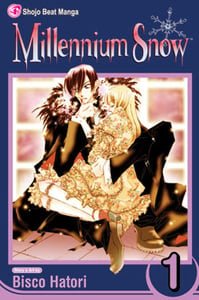Review
by Theron Martin,Millennium Snow
GN 1
| Synopsis: |  |
||
Chiyuki (whose name translates as “1,000 snows”) has had a weak heart since birth, which has perpetually left her in fragile health. Though her goal in life has always been to survive to see the year's first snow, her chances for reaching that goal during her 17th year look grim. Toya is an 18-year-old vampire destined to live as long as 1,000 years. The normal vampire way of things is to claim a companion, who receives the vampire's lifespan in exchange for serving as an eternal source of feeding for the vampire. Toya has been reluctant to do so, however, for he dislikes feeding on people and regards the lengthy lifespan as a source of damnation, and he loathes to inflict that fate on anyone else. Though he detests getting involved with humans because of their weakness, his encounters with Chiyuki start to change his mind. Might they offer each other a solution to their problems? In the side story “A Romance of One Moment,” Midori's longtime best friend Shiki once confided in her that she had a boy living within her. At age 17 problems at home cause the “boy” in Shiki to surface and take over for a while, an occurrence which stirs deep feelings within Midori. |
|||
| Review: | |||
Mang-ka Bisco Hatori may be better-known to American fans as the creator of Ouran High School Host Club, but before that major hit came the two-volume Millennium Snow, which marked her first effort in series manga. Unlike with most manga, Hatori admits that the concept for this one formed around the name rather than the other way around. That explains a lot of things about the structure of the story, whose details do feel like they have been adapted to fit within the frame of the name's double meaning. (It refers both to the name of the lead heroine and her prospect of spending an eternity with Toya.) How else can one explain the inventive but exceedingly atypical notion about a vampire taking a feeding companion whose life extends as the vampire's does? Based on the core concept, one might expect that Toya will be taken enough by Chiyuki's plight and offer of her own blood to solve her health problem by making her his companion. Surprisingly, that doesn't happen, although a way is found to at least partly step around Chiyuki's (literally) fatal flaw and the two do form a sort of relationship. While Toya strives to mope and pretend like he doesn't care, he certainly quickly jumps to Chiyuki's side when problems arise, even getting jealous when a dashing new teen enters the picture. Chiyuki, for her part, fully dedicates herself to inculcating in Toya the passion for life that he will need to face the long years ahead of him. Sound like classic shojo fare? It is, and if such content does not normally set well with you then you may want to avoid this title. Comic relief comes in the form of Toya's servant, the talking bat Yashimaru, who always flies to Toya's rescue when he overexerts himself and quickly becomes a darling friend to Chiyuki. Although the series does show its light-hearted side in other ways, Yashimaru gets the lion's share of such scenes. Playboy Satsuki, who has his own dark secret, forms the third vertex of the requisite love triangle (what would a shojo title be without one?), but this has the unfortunate side effect of sapping attention away from Toya. Hatori's strength is in her writing, which in the main story is hardly brilliant but certainly good enough to be engaging. The artistry, unfortunately, is a significant weakness, one which she acknowledges herself in her side and end comments. She does have a good sense for framing scenes and handles backgrounds capably well, but her highly stylized character designs not only have the typical ridiculously lanky look but simply aren't very appealing despite her efforts to portray Toya and Satsuki as bishonen studs. They also have a roughness and crudeness about them that implies inexperience. Viz Media has released this title under their Shojo Beat label, complete with a slick binding and artsy cover. All sound effects within are translated, with a clear effort having been made to retain the style of the original sound effects. Viz must be commended for the inclusion of “Romance of One Moment,” a completely unrelated chapter-length bonus story which began Hatori's career as a manga-ka. Its artwork is even less refined than the main story's artistry, but anyone who reads it will not doubt that it was an award-winning piece or question why it earned her the right to move on to more lengthy works. It is an exquisitely beautiful and melancholy look at a girl struggling to deal with awakening romantic feelings for her lifelong friend when said friend undergoes a gender-bending personality change. As hackneyed as it may sound in description, the volume is almost worth purchasing for that episode alone, and the higher Story grade given below applies to it. Other Extras include a Glossary and the five-page Egoistic Club, which details some of the creative process behind the creation of this title. As shojo manga goes, Millennium Snow stands at least slightly above the norm despite its weak artistry. Even if it proves not to be your kind of thing, do yourself a favor and at least flip to the back and read the side story. Whatever your normal interests may be, you won't regret it. |
| Grade: | |||
|
Overall : B-
Story : B/A
Art : C
+ "Romance of One Moment" |
|||
| discuss this in the forum (4 posts) | | |||
| Production Info: | ||
|
Full encyclopedia details about Release information about |
||